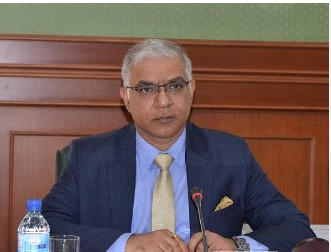Colombo, August 26:
The Hindustan Times reported on Friday, that Santosh Jha, India’s envoy to the European Union in Brussels, is tipped to take the place of Gopal Baglay in Colombo who is to be posted to Canberra, Australia.
Given his strong economic diplomacy background and India’s current deep involvement in Sri Lanka’s economic recovery from a crippling foreign exchange crisis, Santosh Jha will be implementing India’s agreements with Sri Lanka on a range of high-value infrastructure and energy projects based on the decisions made during Lankan President Ranil Wickremesinghe’s visit to State Visit to New Delhi in July.
India is already deeply involved in the Sri Lankan economy following its aid package of US$ 4.5 billion at the height of the island nation’s foreign exchange crisis.
The projects proposed in the “Vision Statement” issued at the end of Wickremesinghe’s visit are to be implemented in the face of stiff competition from China.
Beijing is wooing Sri Lanka vigorously for more projects for itself though, in contrast to India’s generosity, it is still dragging its feet on debt restructuring or extending emergency financial aid to help Sri Lanka overcome the forex crisis.
As Economic Consular in Colombo in the period after the end of the Tamil separatist war in 2009, Santosh Jha was closely involved in the multi-million dollar India-aided economic recovery projects in Sri Lanka. He was also involved in India’s unsuccessful attempt to sign a Comprehensive Economic Partnership Agreement (CEP) with India.
In Brussels, as Ambassador to the European Union, Jha was part of the negotiations to sign an India-EU Bilateral Trade and Investment Agreement.
Like High Commissioner Baglay, who is tipped to go to Canberra as High Commissioner, Jha will be handling ticklish geo-political issues involving China, US, and Japan.
While Baglay will be playing India’s critical role as a non-G7 member of the anti-China QUAD (comprising US, UK, Japan, Australia and India), Jha will also be involved in countering China’s powerful geopolitical influence in Sri Lanka and seeing that Sri Lanka remains irrevocably within India’s sphere of influence.
This is a no-mean task, given Sri Lanka’s tendency to dodge India in both economic and geopolitical matters. As Hindustan Times says, Sri Lanka is “yet to respond positively to India’s strategic concerns vis-à-vis China and is playing host to Chinese surveillance ships and ballistic missile tracking ships in the deep seaports of Colombo and Hambantota.”
But there is an opening now, given the Lankan President’s suggestion that India be given a “land connection” to the Sri Lankan ports of Colombo and Trincomalee, through the construction of a bridge across the Palk Strait, the narrow sea dividing India and Sri Lanka.
India agreed to Wickremesinghe’s proposal. And if pursued, the proposal will be a game changer in India-Sri Lanka economic relations.
In this context of giving India land access to Colombo and Trincomalee, the story in Colombo-based Daily Mirror that Indian Defence Minister Rajnath Singh is to visit Trincomalee assumes significance.
India already has a foothold in Trincomalee, one of the finest deep- water ports in the world, in the form of a 35 year lease on a large number giant oil storage tanks there. India now seeks to turn the hinterland of the port of Tricnomalee into an energy hub in collaboration with Sri Lanka and Japan, keeping China out.





